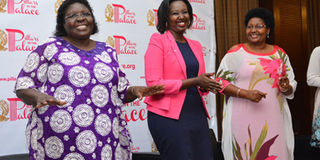What women want in the workplace

Changes. Career women share a light moment at an Empowerment breakfast meeting recently. Women want equal growth opportunities in the workplace. Photo by Godrey Lugaaju
What you need to know:
- Ensuring greater diversity in promotion panels is a good first step that many companies are beginning to take.
With more women graduating from university, and more women pursuing STEM (science, technology, engineering and mathematics) subjects than ever before, we may finally be at a tipping point to start closing the gender gap in the workplace. The World Economic Forum (WEF) has unfortunately predicted that doing so will take five generations at the current pace. However, I’m optimistic. We can make progress more quickly than WEF calculates because our conversations about what needs to change are beginning to include key new elements.
Transparency
The most important of these is a focus on transparency. Most organisations are still far too opaque in their processes, which means all involved, not only women, are left unsure exactly what they have to do to succeed. Organisations need to be clear about what is required to progress and about the exact impact taking time out to have a family or going on flextime for whatever reason will have on careers. These should not be closed-door conversations that lead everyone to think that someone else is getting a better deal.
Time to talk: What needs to change for women at work, a piece of research published by PwC, analysed the results of a survey of 3,627 women around the world, including women at the critical time in their careers where starting a family or taking on caring responsibilities coincides with milestones in career development. It is part of a series looking at different stages in the careers of women. Of the women in this year’s survey, 58 per cent identified the need for greater transparency from their employers to improve career development opportunities.
Let’s start with transparency as it applies to career progression. I have mentored a lot of women and men, and it is almost always the men who are beating down my door asking me about promotions and telling me they are ready, even if they are not.
This fits the stereotype that women believe they have to be 100 per cent competent or overqualified to advance, which is backed up by disappointing evidence that in too many cases this is indeed true. In PwC’s survey, only 17 per cent of respondents said they would put themselves forward for a promotion if they didn’t think they had all the right skills.
Help talented women
The onus here has to be on the employers to help talented people, be they men or women, reach their potential. And for that to happen, everybody must be clear on the criteria for advancement. Women also need sponsors who will push them when they are ready. At PwC UK, we find that when women enter the process to become partners, for example, they succeed at a greater rate than men because they are much more prepared. The downside is that it takes them longer than men to put themselves forward.
At one of my global banking clients, where there is a commitment to diversity from the very top, many senior leadership roles, including heads of significant geographic regions and top portfolios, are now held by women. There is, however, a dearth of women in the middle management ranks. The challenge is how to fill this gap.
Diversity in promotion
Ensuring greater diversity in promotion panels is a good first step that many companies are beginning to take. Behavioural research shows clearly that people gravitate to those who are most like themselves. Having all-male panels can, for example, disadvantage women applicants. People have to be aware of this type of bias.
Skills
When considering promotions into leadership positions, employers also often fail to recognise the kinds of skills that people need at the next level, and focus too much on the skills required of people to do the job they are in. This is particularly true when it comes to technical skills. Leadership roles are not necessarily technical in nature. Being an effective leader is not always about how well you can code, or how familiar you are with the intricacies of regulatory regimes, but rather how effectively you collaborate, build teams, and clearly articulate a vision and values. That is not to buy into more stereotypes that men are better at the hard technical stuff than women. Rather, it is simply a red flag when thinking about the next steps.
Written by Carol Stubbings for strategy-business.com
Stubbings is the Global Head of PwC’s People & Organisation practice




